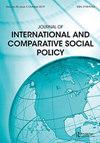解读当代北欧法律和社会公民身份中的国家-公民关系:新冠肺炎疫情中限制行动自由作为缓解政策的分歧案例
Q2 Social Sciences
引用次数: 0
摘要
本文的目的是用解释主义的方法分析北欧国家在COVID-19大流行期间国家-公民关系以及限制人们行动自由的公民权利和社会权利之间的冲突。瑞典(限制是自愿的,依靠轻推和个人执行),挪威(行动限制是针对每个人的,由当局执行)和芬兰(行动限制是针对首都地区的,由当局执行)。瑞典更注重维护公民权利-à-vis社会权利,而在挪威和芬兰,面对大流行病,社会权利比公民权利更重要。因此,分析表明,北欧国家不能在所有方面都被理解为巨石。因此,这篇文章有助于更好地理解北欧政府在被迫选择时如何以不同的方式优先考虑公民和社会权利。本文章由计算机程序翻译,如有差异,请以英文原文为准。
Interpreting the state–citizen nexus in contemporary Nordic legal and social citizenship: the case of divergence in restriction on freedom of movement as a mitigation policy in the COVID-19 pandemic
Abstract The aim of this article was to use an interpretivist approach to analyse the state–citizen nexus in general and the conflict between civil and social rights imposing restrictions on people’s freedom of movement during the COVID-19 pandemic in the Nordic countries: Sweden (restrictions were voluntary and relied on nudging and individual implementation), Norway (restrictions of movement were for everyone and was enforced by authorities), and Finland (restrictions of movement were for the capital region and was enforced by authorities). Sweden focused more on upholding the civil rights vis-à-vis social rights whereas in Norway and Finland social rights have trumped civil rights in the face of the pandemic. Thus, the analysis suggests that the Nordic countries cannot be understood as monoliths in all respects. The article thereby contributes to a greater understanding of how the Nordic governments prioritise civil and social rights differently when they are forced to choose.
求助全文
通过发布文献求助,成功后即可免费获取论文全文。
去求助
来源期刊

Journal of International and Comparative Social Policy
Social Sciences-Sociology and Political Science
CiteScore
3.70
自引率
0.00%
发文量
18
 求助内容:
求助内容: 应助结果提醒方式:
应助结果提醒方式:


